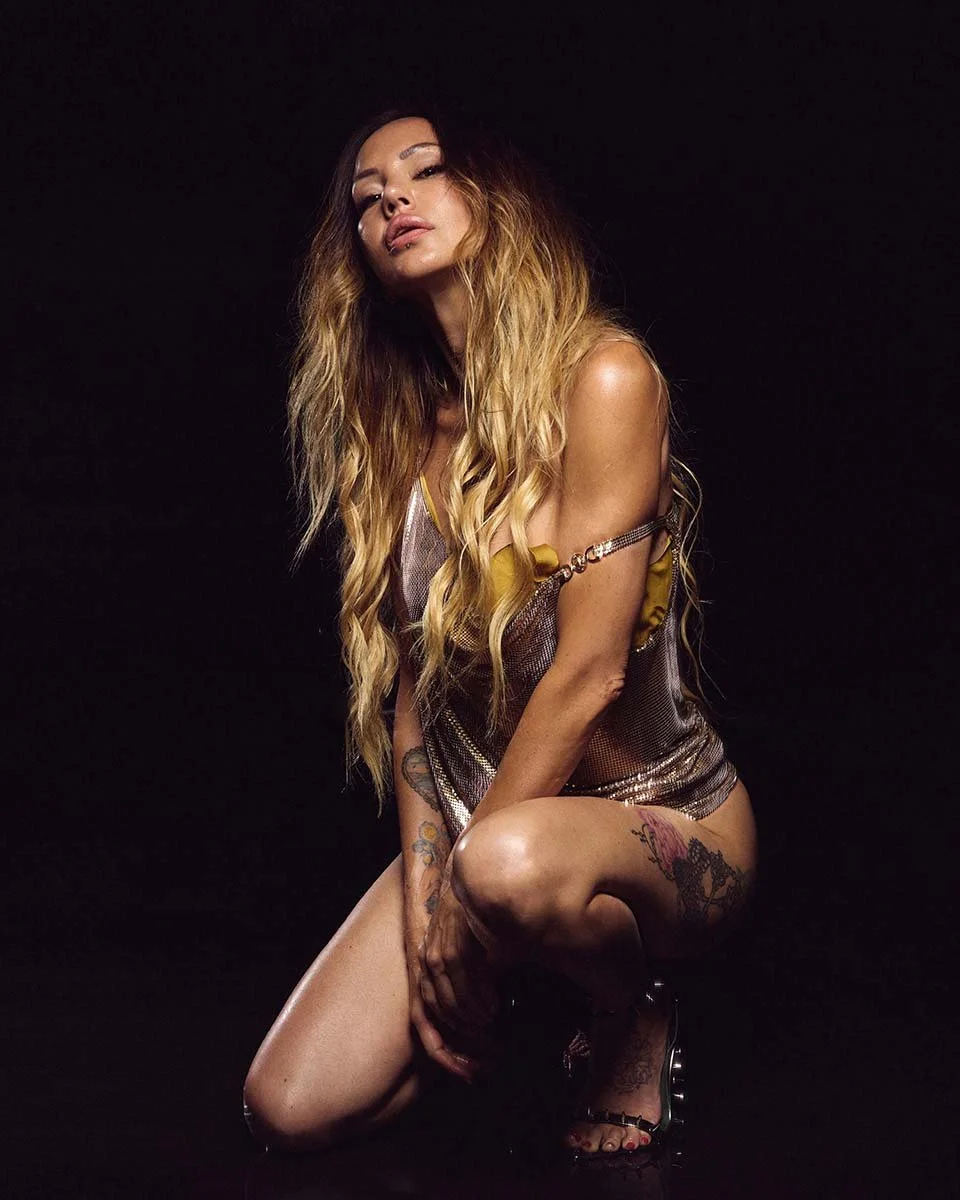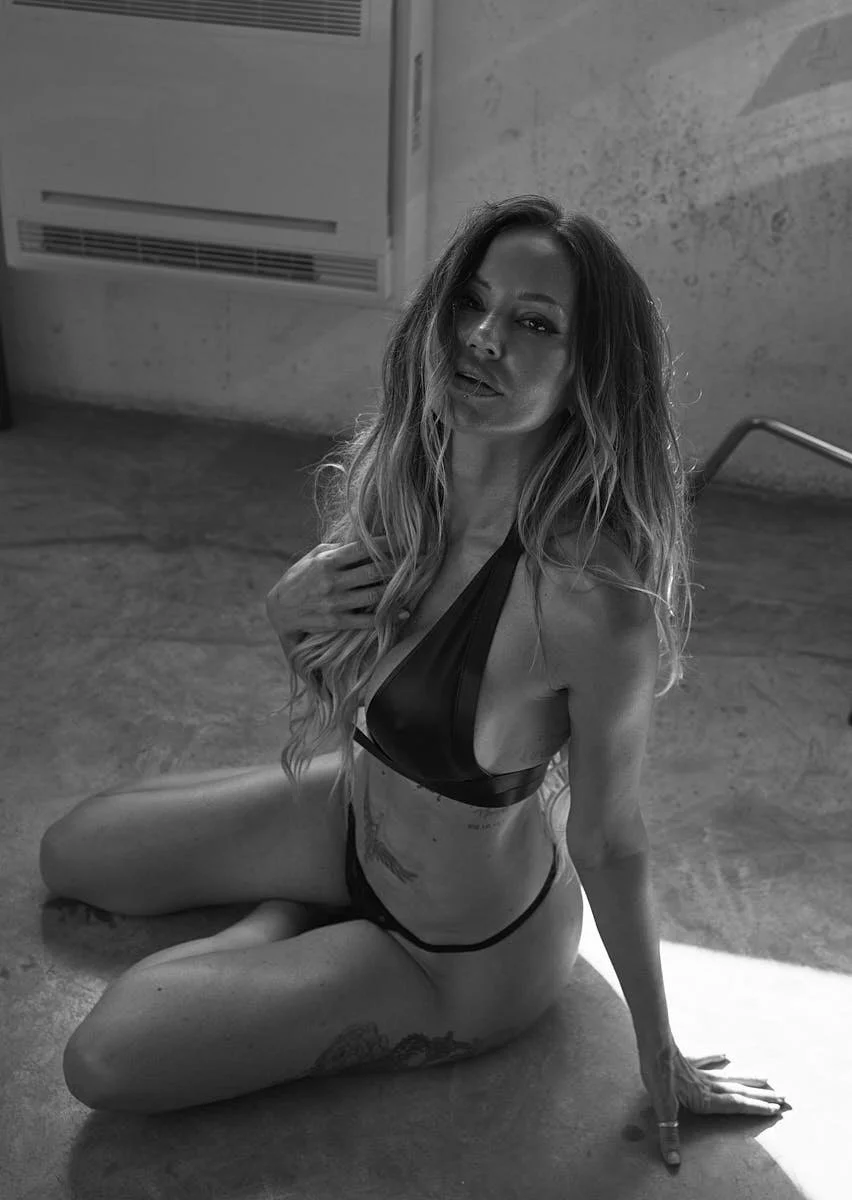DEBORAH DE LUCA
*Equality at 140 BPM
written + interview ALBAN E. SMAJLI
Born in Scampia and wired for motion, Deborah de Luca takes the booth as a surveyor might seize a blueprint, her compass a strobe that scans the crowd.
She draws tempo across faces like lines of elevation, setting three instinctive tracks as a base layer, a quiet study before construction begins. From there she lifts the room piece by piece, each transition a new frame rising into place, until the set breathes as a structure of rhythm and light. Lately the final touch often glimmers with a Gigi D’Agostino refrain — a silver filament stretched through a contemporary shell, binding past and present in one luminous design.
Silence holds a private garden key for Deborah. Life surrounds her with music in studios, in clubs, in cars, so she seeks stillness and lets it refill the body. Between the first record and the last drop new selves appear and dissolve, across long marathons of four to seven hours, a full cycle of morning energy, afternoon charge, evening glow. One word: equality, a law for dance floors where categories melt and a single pulse writes a passport for everyone.
dress VERSACE
shoes LE SILLA
“In a techno club, it doesn’t matter if you’re white, Black, gray, yellow, Christian, Jewish, atheist—inside, we’re all of the same religion: techno.”
Deborah de Luca speaks with Alban E. Smajli
for LE MILE .Digital
Her faith moves through cosmic grammar. God equals the universe, a field of energy, color, and music that answers when addressed with intention. She runs her label since 2013, appetite vivid for sound, image, cinema, miles. Tastes shift like seasons of the tongue, sometimes heavy and hard, sometimes featherlight and melodic, especially in the final hour when the sun inside her sets leans toward amber. Craft sits on both shoulders during those passages, melody braiding with steel, her signature: hard pop, techno fluent.
Small rooms feed her with a certain charge, afters where the ceiling breathes and the floor talks back, like that morning in Florence when the dial locked into hard art techno and a new facet snapped into view. The ugliest sound in her memory came from plastic whistles pecking at the kick, a fashion that squealed and left a sour ring. Spin her catalog from end to start and a path appears, a gradual climb shaped by taste and by the sound of her city, a line that rises in small steps and keeps rising.
When the lights rise and the room exhales, a ritual follows. Fifteen minutes of fierce self audit, choices weighed and corners checked, then a homing current toward bed, toward two dogs, toward the sunset that washes the house in gold and resets the chest. Flights create a sealed capsule where the pilot drives and the grid fades into distance, films flicker, thoughts wander, and nerves surrender. She wants the work to live on, a structure that other hands can lift and carry, music that glows with memory and future. Deborah de Luca composes momentum and mercy in the same breath, a builder who treats crowds like cities and nights like blueprints, and across seven hour marathons or one hour transmissions the mission stays constant, read the room, raise the structure, leave them with a song that follows them home. For a long, long while. Always.
top VOFT KNIT
skirt RICK OWENS
Alban E. Smajli
Your sets feel like architecture. What’s the last thing that shattered your sense of control?
Deborah de Luca
I take “architecture” as a compliment, but honestly, there’s not much pre-built. The first three tracks I already know, because I need time to read the room and understand who’s in front of me. Those first 15 minutes are my time to analyze. From there, I build what comes next. Maybe that’s architecture, but it happens live, piece by piece. Only when I play a DJ set that’s streamed online, like for the Street Parade or my live shows from the Vele di Scampia or at Maradona Stadium those are the only sets I prepare at home. They’re not random but carefully studied since they’ll have media exposure. I decide on the tracks beforehand, or even create some pieces specifically for the occasion, but I never fix their order.
You grew up in Scampia. Now you tour the world pulsing through Funktion-Ones. Is there still a part of you that hears silence and gets suspicious?
Actually, I love silence, I don’t become suspicious. When I get in the car, I turn the music off; if a driver is with me, I turn it off; if I’m at a restaurant, I like silence. Because I live constantly with music—when I make it, when I listen to others, when I work in clubs, or when I hear someone play before or after me. So I need silence, I look for it, it regenerates me.
How many versions of you exist between the opening track and the last drop at 4:37 a.m.?
The first track is always mine, the last one is usually not, especially lately, when I like closing with a Gigi D’Agostino piece from the early 2000s. So no, I’m not the same from the first to the last track. I take a journey, especially if I play long sets of 4, 5, even 7 hours. I’m not the same person from the first to the last record. Sometimes I come back, then I drift away—it’s the same in life. You wake up one way in the morning, by afternoon you have different energy, and in the evening it changes again.
Do you believe in God? Or just in bass?
I believe, but not in the God most people think of—not that man with long hair and blue eyes, born in Jerusalem, who should have been darker-skinned anyway. I don’t believe in that. I believe in the universe. For me, God is the universe. When you ask for something, you ask the universe. The energy comes from the universe, you attract it. To me, that’s the same thing—God is the universe. But it has no human figure; it’s everything around us: energy, colors, music. That, for me, is God.
top VOFT KNIT
skirt ISZA
lip ring ASK & EMBLA
You run your own label. Do you still feel hunger, or is it something deeper now? Obsession maybe, or ritual?
I’ve managed my label alone since 2013. I’m always hungry, and that will never pass—whether for music, colors, friendships, films, travel. Hunger will never leave me. Sometimes I just change tastes—sometimes I want sweet, sometimes salty. In music, sometimes heavier, harder; other times softer, like in the last hour of long sets. But yes, the hunger never fades.
Do you miss the chaos of small clubs? The kind where the smoke machine breaks and the floor sweats back at you?
I miss the energy of small clubs a lot. Sometimes, when after a festival I play a little after-party in a small place, I’m really happy, because you’re closer to people. It also gives me a different idea of music, I play differently. For example, last time in Florence, in a club after a festival, I was much harder than usual—very art-techno. I discovered a new side of myself there.
What’s the worst sound you’ve ever heard on stage?
When the sound system isn’t as it should be and the monitor speaker starts crackling, it’s terrible — it breaks the magic.
If someone played your full discography backwards, what message would emerge?
You’d hear the journey. Where I started slowly, climbing step by step—not mountains, just hills. I evolved with my own taste, with people’s taste, with the sounds around me, with the influences of my city. You’d hear that it’s been a steady path upward—not of highs and lows, but always slowly rising.
Techno doesn’t need words, but if it did—what would yours be? Just one.
Equality. In a techno club, it doesn’t matter if you’re white, Black, gray, yellow, Christian, Jewish, atheist—nobody cares. Inside, we’re all of the same religion: techno. And that’s something very beautiful.
What keeps you OFFLINE when your whole life runs on voltage and signal? Or is OFFLINE just a myth sold to the unplugged?
My home, my dogs, the sunset at home. Also when I fly. Yesterday I had a 14-hour flight and could have connected, but I didn’t. On planes, I let the pilot drive, I rest, I disconnect completely. When I’m not flying, it’s still my dogs and my home that keep me offline.
You’ve built something—music, myth, a kind of feminine rage wrapped in steel. Do you ever worry it’ll outgrow you?
No, I don’t think it can become bigger than me. Music is understandable for everyone, and even if it grows, it remains something elementary. I never feared it could outgrow me.
When the lights come up and the bodies thin out, when it’s just sweat on the floor and silence in the booth, where does your mind go? Who do you become when the music stops?
Honestly, I’m very tough on myself. The first 15 minutes after a set I spend thinking I haven’t done my very best—that I should have played another track, that something was too easy, too commercial, or too hard. Even when everyone says it was great, I criticize myself. Then I can’t wait to get into bed, and to go home to my dogs.
“For me, God is the universe. Energy, colors, music—that, for me, is God.”
Deborah de Luca speaks with Alban E. Smajli
for LE MILE .Digital
top YVY LEATHER
panties MAISON CLOSE
photographer NICHOLAS FOLS
styling + production ANCA MACAVEI
styling assistants JYOTHSANA SELVAM + LESLIE GUERRA
assistant on set MELISSA RUSSO
talent
DEBORAH DE LUCA















